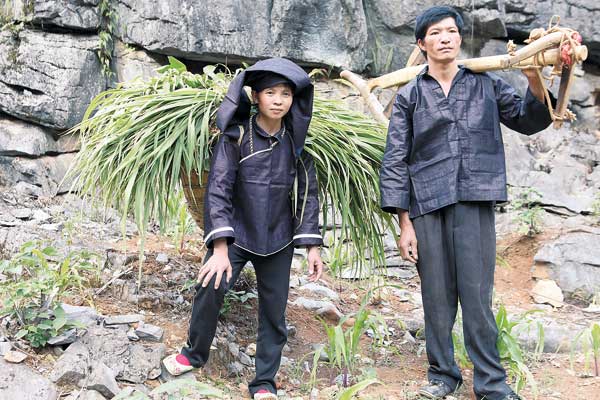Members of the Heiyi (black-clothed) Zhuang ethnic group still maintain their traditional lifestyle. But villagers worry it is fast disappearing. Li Yang visits them in Napo county, Guangxi Zhuang autonomous region.
 |
| Many Heiyi Zhuang people still carry on the tradition of wearing black clothes in Napo county, Guangxi Zhuang autonomous region. [huo yan / china daily] |
Dawen village is nestled in the mountains near China's border with Vietnam. The nearest town is Longhe in Napo county, which is two hours' walk away.
The village is home to people of Heiyi (black-clothed) Zhuang.
The Zhuang ethnic group, with a 15 million population, is the largest ethnic group after Han Chinese in China. Of the 12 branches of the ethnic group, Heiyi Zhuang is the only one that still maintains their traditional lifestyle.
The people make and wear black clothes and hoods. Legend has it that their ancestors were once protected by the color of indigo from monsters in dark forests.
The bumpy mountain path and complicated mountain topographies are natural barriers against not only chaos of wars in the past, but also prosperity of modern society today.
The villagers' ancestors fled to the small basin along the Youjiang River valley from Nanning, capital of Guangxi Zhuang autonomous region, in the late Qing Dynasty (1644-1911).
The only access to Dawen is a steep gravel mountain path over a cliff.
The village's square is a basketball court with rusty stands, now used as clothes driers. On one side of the court is a clinic and a large yard partly enclosed by three two-story wooden buildings.
According to Liang Jincai, the gatekeeper of the yard, this is a museum sponsored by a joint program of Chinese and Norwegian governments.
The museum was constructed in 2008 by villagers of Dawen. Most exhibits were contributed by the villagers, including articles of daily use.
Liang, 75, a retired village head, works in the museum as the only attendant.
He is also the ritual leader. But his role is diminishing.
